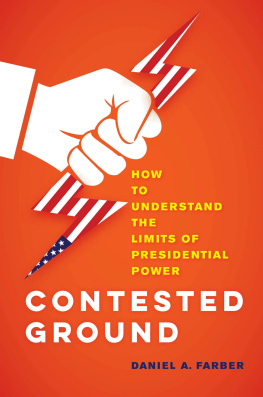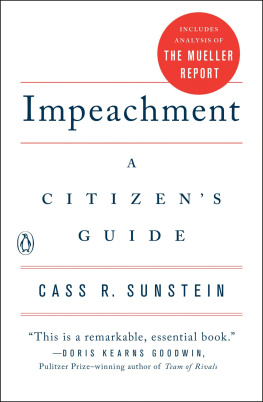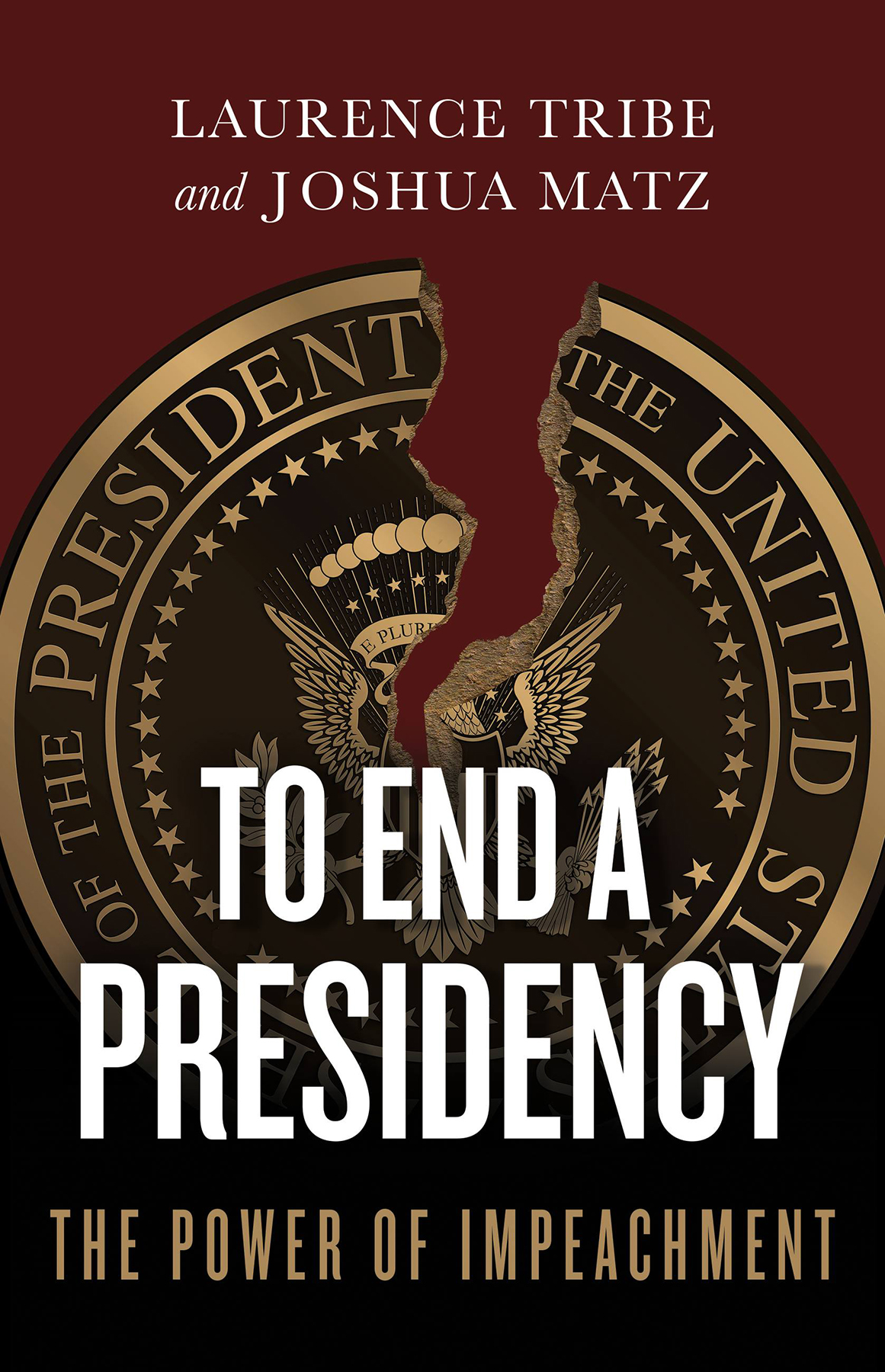Copyright 2018 by Laurence Tribe and Joshua Matz
Hachette Book Group supports the right to free expression and the value of copyright. The purpose of copyright is to encourage writers and artists to produce the creative works that enrich our culture.
The scanning, uploading, and distribution of this book without permission is a theft of the authors intellectual property. If you would like permission to use material from the book (other than for review purposes), please contact permissions@hbgusa.com . Thank you for your support of the authors rights.
Basic Books
Hachette Book Group
1290 Avenue of the Americas, New York, NY 10104
www.basicbooks.com
First Edition: May 2018
Published by Basic Books, an imprint of Perseus Books, LLC, a subsidiary of Hachette Book Group, Inc. The Basic Books name and logo is a trademark of the Hachette Book Group.
The Hachette Speakers Bureau provides a wide range of authors for speaking events. To find out more, go to www.hachettespeakersbureau.com or call (866) 376-6591.
The publisher is not responsible for websites (or their content) that are not owned by the publisher.
Library of Congress Cataloging-in-Publication Data
Names: Tribe, Laurence H., author. | Matz, Joshua, author.
Title: To end a presidency : the power of impeachment / Laurence Tribe, Joshua Matz.
Description: New York, NY : Basic Books, 2018.
Identifiers: LCCN 2018010873 (print) | LCCN 2018011754 (ebook) | ISBN 9781541644878 (ebook) | ISBN 9781541644885 (hardback)
Subjects: LCSH: ImpeachmentsUnited States. | PresidentLegal status, laws, etc.United States. | United StatesPolitics and government1989- | BISAC: LAW / Constitutional. | POLITICAL SCIENCE / Constitutions. | POLITICAL SCIENCE / Government / Legislative Branch. | POLITICAL SCIENCE / Government / Executive Branch. | LAW / Government / Federal.
Classification: LCC KF5075 (ebook) | LCC KF5075 .T75 2018 (print) | DDC 342.73/062--dc23
LC record available at https://lccn.loc.gov/2018010873
ISBNs: 978-1-5416-4488-5 (hardcover), 978-1-5416-4487-8 (ebook)
E3-20180406-JV-NF
CONTENTS
Navigation
This is a spectacular book. It is essential, riveting reading for anyone trying to make sense of the impeachment question as citizensor as members of Congress. Laurence Tribe and Joshua Matz have a special knack for logical and historical clarity, and To End a Presidency left me not only knowing more, but also thinking better.
Zephyr Teachout, author of Corruption in America
This is the definitive book on how to end a national nightmare. No dubious constitutional theories, just real law, real procedures, and real ideas for moving forward. Where Special Counsel Robert Mueller leaves off this book will pick up. The real deal.
Richard W. Painter, S. Walter Richey Professor of Corporate Law, University of Minnesota Law School, and chief ethics counsel for President George W. Bush
For our partners, Elizabeth and Hillel
Impeachment haunts Trumpland. Never before has an American leader so quickly faced such credible, widespread calls for his removal. By early 2018, the list of alleged high Crimes and Misdemeanors included abuse of the pardon power, obstruction of justice, assaults on the free press, promotion of violence against racial and religious minorities, receipt of unlawful emoluments, deliberate refusal to protect the nation from cyberattacks, and corrupt dealings relating to Russia. President Donald J. Trump fueled these fires by rejecting bipartisan norms of presidential conduct and by ferociously attacking anyone who dared to challenge him. Reeling from this onslaught, the American public has fractured. Some warn that Trump is moving us inexorably toward tyranny and global war. Others have circled their wagons, convinced that Trump is uniquely capable of saving the United Statesif only political elites will let him. A dwindling group of fence-sitters finds itself besieged on all sides. Calls for Trumps impeachment, and indignant rebukes of those calls, echo everywhere from TV screens and editorials to Facebook comments and Twitter feeds.
Its now clear that as long as Trump holds the nations highest office, Americans will actively debate his impeachment. Indeed, as we write this book, over 40 percent of the US electorate supports action to force Trump from power. Roughly 30 percent of voters, in contrast, would view impeachment proceedings as a coup in disguise. In these stormy waters, it is entirely possible that impeachment investigations will already have begun when this book is published. Thats an extraordinary disclaimer to include just one year into a presidential term. But since Trump took office in January 2017, extraordinary has become the new normal.
Of course, that story is much larger than events in the Oval Office. These are angry, anxious times. Tempers run high on TV and social media, fueled by the chattering class and a booming outrage industry. Sharp partisan divisions poison US politics, and the government frequently struggles to govern. Weve seen a sharp rise in hate crimes, economic inequality, drug addiction, and social conflict. Weve also witnessed steps toward the unraveling of a liberal international order, including triumphs by right-wing extremists abroad. An unyielding sense of crisis has gripped much of the nation, centered on Trump but swirling outward into every corner of the polity. Democracy itself feels threatened by enemies foreign and domestic. Many now count Trump among those enemies, though millions still view him as the nations long-awaited savior.
This combination of political polarization, incendiary rhetoric, and widespread anxiety has yielded a highly unstable climate in which to debate impeachment. Its therefore important that the American people develop a shared, well-grounded understanding of impeachments role in the US constitutional order. We need a baseline for reasoned discussion and disagreement. That calls for cool and evenhanded reflection, informed by the Constitution and lessons from history. It also requires nuance, rather than absolutes, and the capacity to look beyond reflexive partisan loyalties. Impeachment is not just another form of political combat; its an emergency measure meant to save the democratic foundation on which all other politics unfold.
In approaching this issue, we must aim to strike a balance. Intense disagreements and the pressures of partisan hostility can lead people who lose an election to view the victor as an existential threat. Over the past twenty years, the switch from electoral loser to impeachment supporter has occurred fasterand on a larger scalethan at any previous point in US history. But sore losers are often matched by self-righteous winners. Especially when the other side has cried wolf many times before, a presidents base can too quickly ignore well-founded fears of tyranny and corruption. A premise of the impeachment power is that leaders may disappoint our expectations in the most tragic and destructive ways. Its therefore essential to resist both of these attitudes toward impeachment. The specter of a banana republic lurks at either extreme.
While casual calls for #impeachment now litter the Internet, ending a presidency this way remains a verybig deal. Its easy to forget that the United States has never actually impeached and removed a president. Although that was the likely outcome had Richard Nixon remained in office, he resigned before the House of Representatives formally approved articles of impeachment against him. On the two occasions that the House did impeach a presidentAndrew Johnson and Bill Clintonthe Senate ultimately acquitted, albeit in Johnsons case by only a single vote. We therefore have no historical experience with the full consequences of pushing that red button. Instead, weve generally relied on presidential term limits, the forces of civil society, federalism, and checks and balances to mitigate the damage inflicted by terrible leaders.






